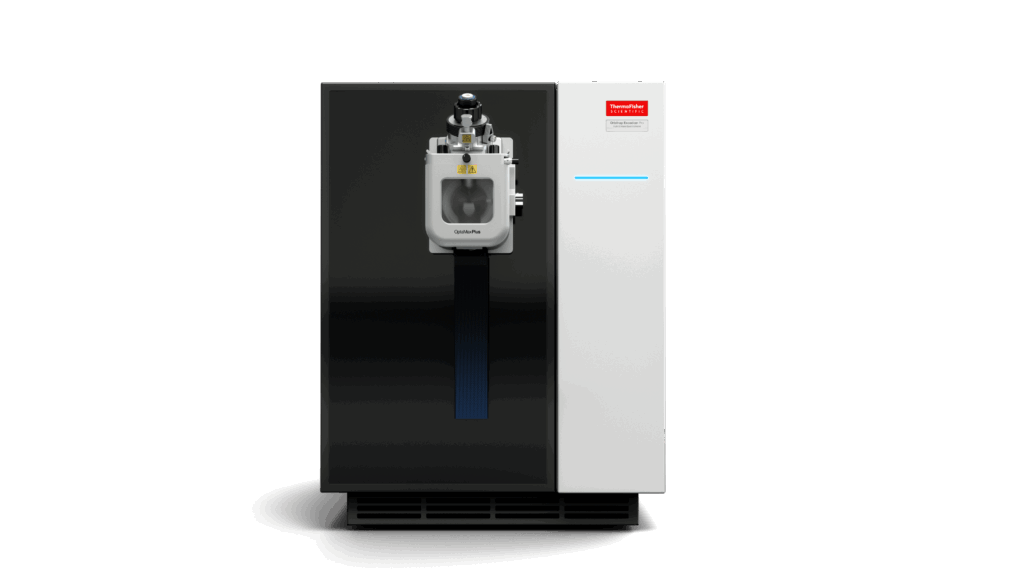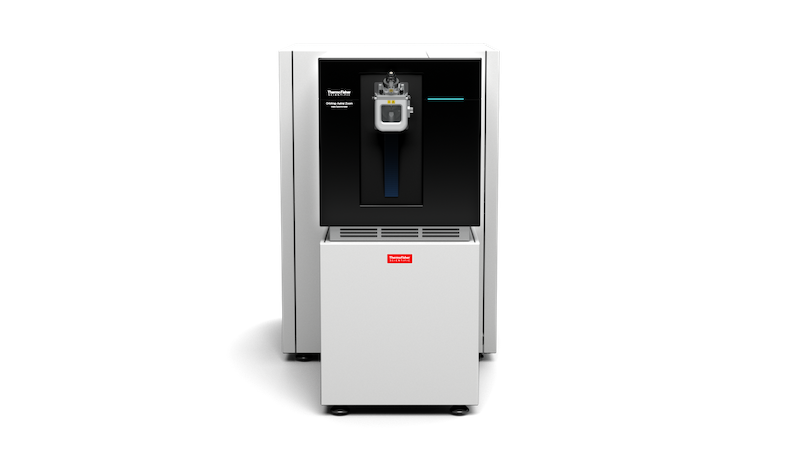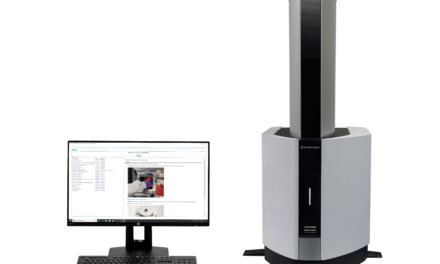Summary:
At the 2025 ASMS Conference, Thermo Fisher Scientific unveiled advanced mass spectrometry instruments—Orbitrap Astral Zoom MS and Orbitrap Excedion Pro MS—designed to accelerate scientific discovery in precision medicine, multiomics, and drug development.
Takeaways:
- Orbitrap Astral Zoom MS delivers 35% faster scan speeds and 40% higher throughput, enabling high-volume proteomics workflows such as analyzing 300 human proteomes daily.
- Orbitrap Excedion Pro MS with EASY-ETD technology enhances structural analysis of complex molecules, improving insight into protein therapeutics and drug mechanisms.
- These innovations aim to reduce analysis timelines drastically, advancing research in diseases like Alzheimer’s and cancer, while supporting environmental and food safety studies.
To help customers advance scientific discovery, Thermo Fisher Scientific unveiled state-of-the-art solutions at the annual American Society for Mass Spectrometry (ASMS) Conference on Mass Spectrometry and Allied Topics, held in Baltimore, Md. These next-generation instruments and software offerings represent a paradigm shift in analytical performance – designed to reveal complex biological processes and critical insights into disease mechanisms that can transform multiomics, biopharma, environmental and food safety research.
“At Thermo Fisher Scientific, we’re revolutionizing the scientific landscape and delivering unprecedented insights that drive progress where our customers need it most,” says Dan Shine, senior vice president and president of analytical instruments, Thermo Fisher. “By combining higher-performing instruments with technology that support innovative, end-to-end workflows, we’re helping researchers expedite discoveries that will impact human health, drug development and environmental sustainability.”
Accelerating Discovery with Unprecedented Performance and Integrated Technology
Thermo Fisher introduced two mass spectrometry instruments that deliver unrivaled analytical performance and speed to uncover complex biological processes that could lead to advancements in precision medicine and significant insights for complex diseases like Alzheimer’s and cancer.
Expanding on the success of the award-winning Thermo Scientific Orbitrap Astral mass spectrometer (MS), the Thermo Scientific Orbitrap Astral Zoom MS redefines high-resolution accurate mass spectrometry (HRAM) performance with 35% faster scan speeds, 40% higher throughput, and 50% expanded multiplexing capabilities. These advances significantly shorten analysis timelines – reducing the processing time for 6,000 research samples from 1,000 days to just 100 – thereby accelerating research and discovery in critical areas such as Alzheimer’s disease and cancer.
“The Orbitrap Astral MS has been a huge step forward in performance for us, and the data we have generated with the Orbitrap Astral Zoom MS is even more exciting,” says Jesper Olsen, PhD, Professor, University of Copenhagen, Denmark. “We can now routinely analyze 300 human proteomes per day. This allows us to do very detailed systems biology studies, where we get sufficient coverage of close to 8,000 proteins and more than 100,000 peptides across all the samples.”
Expanding the Orbitrap family of analytical instruments, the Thermo Scientific Orbitrap Excedion Pro MS with EASY-Electron-transfer dissociation (EASY-ETD) allows researchers to break apart complex molecules to better study the structure and sequence of proteins. With improved sensitivity, expanded dynamic range, and alternative fragmentation, the Orbitrap Excedion Pro MS accelerates developments in biopharma, proteomics, and metabolomics research. Researchers can see more of small and large molecules to better understand drug and protein therapeutics like monoclonal antibodies (mAbs) and expedite treatments in cardiology, neurology, and oncology.

“The Orbitrap Excedion Pro MS surpasses its predecessors through the addition of electron transfer dissociation (EASY-ETD) and an extended mass range,” says Andrew Mahan PhD, Associate Director, Johnson & Johnson Innovative Medicine. “Initial data shows that high spectral acquisition rate of EASY-ETD results in deeper protein sequence coverage, improved post-translational modification characterization, detection of large aggregate impurities, and richer fragmentation patterns for confident disulfide linkage assignments. These improvements provide immediate value to our biotechnology work and will serve as our next-generation platform.”
Complementing Mass Spectrometry Technology with Solutions for Enhanced Omics and Proteomics Applications
At ASMS, the company also unveiled the Thermo Scientific OptiSpray technology to empower omics researchers of all experience levels to generate reliable, high-quality LC-MS data with ease and expedite critical discoveries.
The OptiSpray technology physically connects liquid chromatography (LC) to mass spectrometry (MS) in an automated, easy-to-use system. By reducing the need for manual adjustment, the accessory not only saves valuable time but also dramatically simplifies the acquisition of reproducible data across columns, instruments, and different end-users. OptiSpray ion source and cartridge-based nano and capillary columns are compatible with our leading portfolio of Thermo Scientific Orbitrap and Thermo Scientific Stellar mass spectrometers as well as the Thermo Scientific Vanquish Neo UHPLC System, increasing ease-of-use for MS-based proteomics applications.
ASMS attendees can also experience Olink’s innovative Proximity Extension Assay (PEA) technology and the Olink Insight software platform, which deliver exceptional specificity and sensitivity for low-abundance proteins. These offerings work side-by-side with mass spectrometry methods to increase proteome coverage for biomarker discovery and validation. Olink and mass spectrometry-based proteomics form a powerful complement for the analysis of human samples such as plasma, enabling researchers to dig deeper into the causes, effects and treatments of disease.
Building a Connected, Secure Software Ecosystem for Modern Labs
As laboratories work to boost productivity and efficiency, the demand has never been greater for software that seamlessly connects data, applications, and instruments. Thermo Fisher has introduced several enhancements to its connected technology offerings to meet the needs of scientists today, providing advanced applications and critical compliance across research settings from life science discovery to improved water quality testing.
- Thermo Scientific Chromeleon 7.4 software offers the first scalable, networked software platform to fully support targeted, quantitative MS workflows across Thermo Fisher’s instruments, such as the Thermo Scientific Stellar MS. With the ability to control, monitor, and access instruments and data from anywhere, Chromeleon 7.4 software stores all data in a single central location while enabling GMP compliance. New levels of automation and data sharing offer a competitive edge to improve the efficiency, scalability, and reliability of research in biopharma, environmental, and food safety laboratories.
- Thermo Scientific Proteome Discoverer 3.3 software now supports targeted proteomics data and automated processing of fractions with the Thermo Scientific Ardia Platform. The technology streamlines Thermo Scientific Tandem Mass Tag (TMT™) automation with cutting-edge technologies like TMT HD mode, Adaptive RT routine, and Data Independent Acquisition (DIA) to enable faster and more precise proteomics workflows.
- The Thermo Scientific Compound Discoverer 3.5 update includes algorithm and detection advancements to improve lipid application support while integrating the advanced Thermo Scientific Mass Frontier 8.1 software’s algorithm, enhancing in-silico fragmentation prediction. Data export now includes compatibility with Chromeleon software to simplify the transition from discovery to screening for both LC/MS and GC/MS.
Featured Image: The Thermo Scientific Orbitrap Astral Zoom MS provides high-resolution accurate mass spectrometry (HRAM) performance with 35% faster scan speeds, 40% higher throughput, and 50% expanded multiplexing capabilities. Image: Thermo Fisher Scientific





